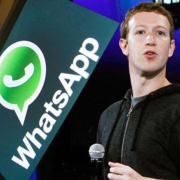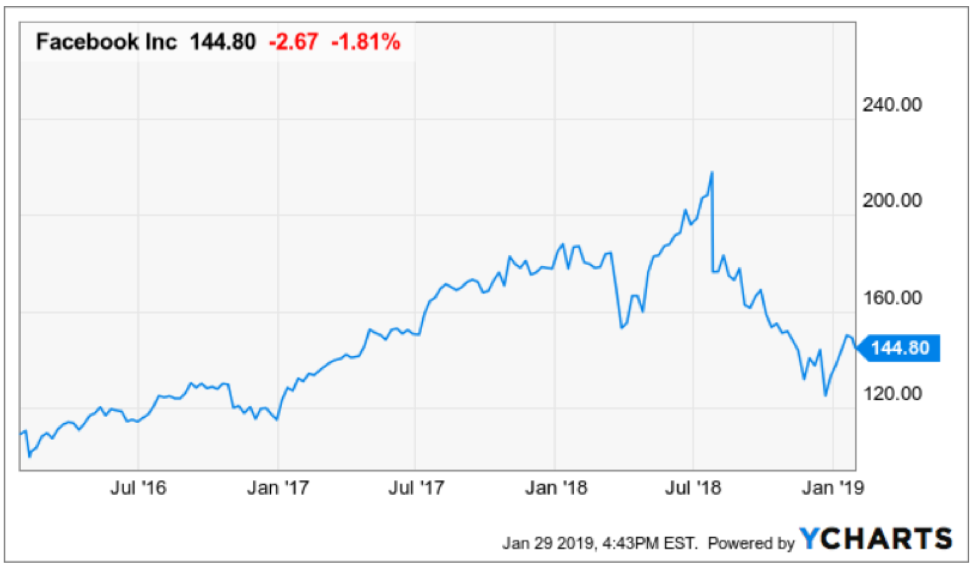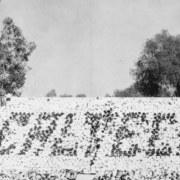Is the Bottom in for Facebook?
As much as I malign Facebook (FB) CEO and Founder Mark Zuckerberg, the risk-reward for Facebook’s earnings that come out after Wednesday’s close favor the upside.
Let me explain.
I have been bearish on this name for quite a while and I have been rewarded in spades.
From the Cambridge Analytica leak to firing the heads of Instagram and WhatsApp, last year was a year to forget and the stock was crushed.
This time, it’s a little different.
I believe the saturated business model has largely been priced in to the stock and the company is transitioning to a more lucrative side of the business with other levers they can pull.
Facebook can’t move mountains to raise the needle in the number of users in the western developed world.
The rich western world is Facebook’s profit engine with average revenue per user remarkably higher than its emerging user audience.
The company will change tact and seek to increase average revenue per user because of decelerating usership.
Emerging markets are the last bastion of growth for its user base, but unfortunately, this source of new users cannot be lucratively monetized like its staunch North America and Western European cash cows.
The lion's share of new users are from countries including India, Indonesia and Philippines where advertisers focus more on TV, print and physical advertising.
Expect Facebook to announce slowing user growth in the low single digits.
This likely won’t be a surprise to markets along with more rumblings about the average age of user increasing as Generation Z flees the platform.
The silver lining in this development is that Generation Z is fleeing Facebook and migrating to Instagram which is also owned by Facebook and a hyper-growth engine.
Even with the younger generation deleting Facebook in droves, Facebook still has a base of over 2 billion and every one of these customers use one of Facebook’s four services every day.
That is partly why it is attractive to digital advertisers and Facebook culls 98% of total revenue from ads.
If you forgot about last quarters earnings, Facebook handily beat EPS forecasts by 30 cents and barely missed on the top line, and that was in the face of disturbing ructions of a full-on regulation tech lash.
The first stage of negative regulation and the fallout have effectively been absorbed by the market and the second stage isn’t visible on the horizon as of today.
That day will eventually come but not before they come out with earnings later today, and not where near-term guidance will be materially affected.
If you read Mark Zuckerberg’s New York Times op-ed, he still believes that any road bump can be parsed over with marketing gibberish, and I would agree that the next stage of regulation that could damage the company is far away enough that this stall tactic will work for this particular earnings report.
However, this myopic and dangerous strategy must be managed quarter to quarter. There will be a time when the market needs to hear how Facebook will actually fix the model if a new wave of tech fury erupts.
The firm is safe now as the general trend for more robust regulation has started muted at the beginning of 2019 with congress and the administration busy with a closed government and political infighting bordering insanity.
This type of national news jumps to the forefront and pushes back the possible timeline for enforced regulation especially when 800,000 government workers were broadsided and couldn’t put food on the table or pay their rent.
To follow up on the political front, management is sure to take last year’s midterm election success and milk it for all its worth.
There were no disastrous scandals, recounts, or platform manipulation that could potentially do harm to the stock.
Facebook will tout this as a sign that its controls are starting to reap dividends and concrete evidence that they have shaped up since the Russian interference compromised the business model during last presidential election.
In late 2018, Facebook forecasted expenses to grow 40%-50% in 2019.
The headline expense number was set astronomically high in order for management to easily beat forecasts and announce that today.
Since management has categorized many material problems as marketing fixes, they have normalized doing the bare minimum as a stopgap measure masquerading as a real, full blown fix.
The one insight that keeps slamming me straight in the face like a gale force wind is that Zuckerberg likes his money which means he needs the stock to go up.
That would be the pitiful reason he offers these half-baked excuses as legitimate fixes because he understands that comprehensive solutions would be too costly damaging future earnings.
He also needs the stock to go up because many of the new faces at Facebook are compensated by stock because of a lack of cash on hand.
What is a meaningful catalyst to take Facebook higher?
The firings of the heads of WhatsApp and Instagram paved the way for the transition to 2019 where Facebook will monetize these other two services as well as integrating the back-end with Facebook.
This is viewed as the holy grail of Facebook growth and Zuckerberg incessantly refuted this would ever happen.
Well, the cat is out of the bag now.
In integrating the back-end of these three services, Facebook will extract a deeper insight into the behavior of their usership with a 360 degree view of their daily habits.
This deeper understanding of behavior will allow them to harvest the data in a way that is more valuable to digital ad buyers.
Facebook plans to compensate the lack of user growth for higher quality ads, and in turn they will be able to charge the ad buyers more per ad.
This strategy is a high risk, high reward maneuver because the company will intrude more into the personal data of their users than ever before.
On a business level, Zuckerberg has few options left up his sleeve and is predictably migrating towards the low hanging fruit as well as his best option today.
There is not much juice he can squeeze out of dinosaur Facebook anymore and margins will come down from now on.
However, WhatsApp and Instagram are fertile pastures for Zuck to wield his ad-hawking expertise.
Readers might forget that there are no ads on WhatsApp yet and its virgin provenance has been left largely unchanged from the beginning offering Zuck a golden project to mold his paws on.
If the CEO of Facebook goes into details about Facebook’s plan to ramp up these two social media platforms, the stock has a good chance to react positively.
The bar has been set quite low and Facebook has targeted this earnings report as an inflection point in the company’s history as they begin to pull alternative levers available to them.
This is a short-term prognosis in an otherwise murky future for the company.
Challenges are endless and part of the ceaseless issues involves Facebook not adding any real value as a technology platform or not possessing any ground-breaking technology or proprietary software.
Facebook is the used car salesman of the tech world and they are doing everything they can to stay relevant.
If Facebook does sell off after the WhatsApp and Instagram integration announcement, it is safe to deduce that Facebook is out of bullets and the stock becomes a sell on the rallies company until they can do something to stem the blood flow.






